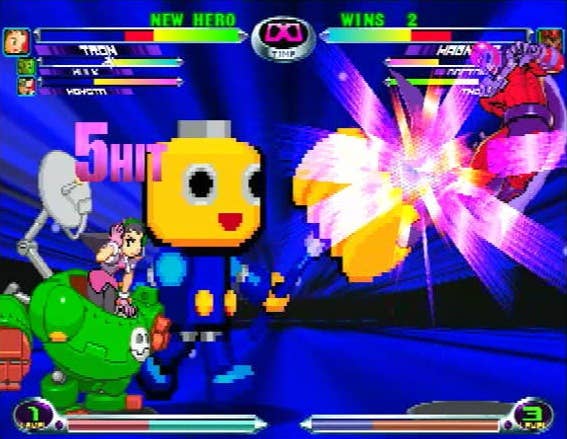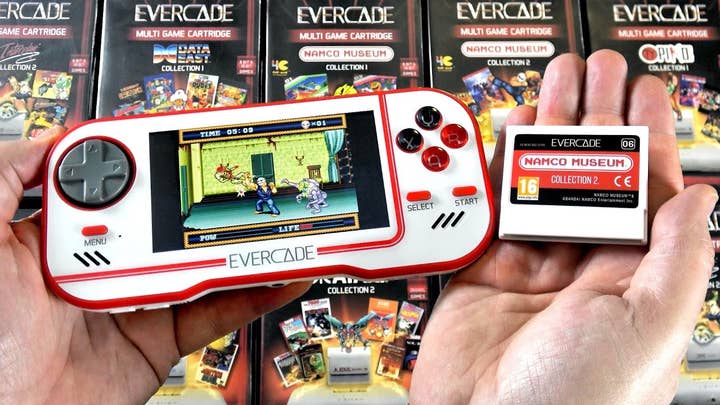Games of previous years | Games of the Year
Burned out by the mind-numbing familiarity of new games, one writer took solace in the mind-numbing familiarity of old games
(After writing this up, it was pointed out to me that I basically stole our publisher Chris Dring's idea from last year. I hadn't recalled that piece when I sat down to write this one, and I'm coming at it from a slightly different angle, so let's just say these are two separate data points for our readership suggesting that there is a largely underserved market of long-time gamers with discretionary income looking to enjoy the games of their youth so maybe more of the big companies should think about addressing that and not just cherry-picking the same five franchises to remake to death.)
I had an epiphany in 2021. It happened less than an hour into playing Double Fine Productions' Psychonauts 2. I had just hopped and bopped my way through the mental architecture of a villainous dentist, a set piece opening full of the weird, creative, and clever levels and characters that defined the cult classic first game back in 2005.
If I had a checklist of qualities to look for in a good game, it was checking off most of them. The platforming didn't quite feel precise enough for me -- which is a significant problem in an action platformer -- but the entire game had left me oddly cold. And then we hit the point where protagonist Raz begins officially working with the Psychonauts and is handed an intern manual. He flips to a page titled "Psi Powers!"
"This section of your Manual tracks the progress of any PSI Powers you are authorized to use while in the Intern Program," it reads. "As your rank increases, you will earn Intern Credit, which you can spend here for PSI Power Upgrades. Use of unauthorized powers is strictly prohibited."
And that was it. I was done with the game. I read that line and felt like I knew everything I needed to know about how the rest of the game would play out, and it felt more or less the same as every modern AAA game I had played in recent years. It felt like working a bad job, like tediously chipping away at a long-term goal I no longer cared to achieve. And I just don't have the free time for games like that any more.
Burned out by the mind-numbing familiarity of modern AAA games, I did what any reasonable person would and started devoting my gaming time to the mind-numbing familiarity of older games.
I dug up my old Sega Dreamcast and was delighted to find it still operational more than 20 years after Sega gave up on the hardware market entirely. I refreshed my memory with some old favorites, and while the games were every bit as familiar as the modern AAA fare, they were also more respecting of my time. Granted, most of them were ports of arcade games made to keep you plugging in quarters, so the original design intent was probably much less "respecting of my time" as it was "demanding of my wallet." But at least each offered a concentrated style of game that was as enjoyable in small doses as well as large.

I burned through Chu Chu Rocket's excellent puzzle mode in an hour. I reveled in the B-movie absurdity of House of the Dead 2 and Confidential Mission. I squealed in unexpected joy when I discovered my memory card had failed so I would need to playthrough a ton of Marvel vs. Capcom 2 to unlock all the fighters again. I quickly re-learned all my favorite nasty tricks with Astaroth in a Soulcalibur playthrough, because plowing somebody's face into the ground with an oversized battle axe has a surprising amount in common with riding a bike. I cackled once again at the unconscionable carnage of San Francisco Rush 2049's stunt mode. (It's like Tony Hawk's Pro Skater if it were as hard as actual skateboarding and failing to land a trick meant you blew up.)
Having wallowed in some of my favorites for a while, I started thinking back to all the games I never got around to trying. After nearly choking when I saw what even mediocre Dreamcast games are being sold for these days, I ponied up for Ms. Pac-Man's Maze Madness, a brilliant sequel to the original arcade game that keeps the simple controls and builds more complex worlds and puzzles around it. I bought a bunch of old shoot-'em-ups, compilations, and Arcade Archives titles on Switch, like Capcom and Cave's amazing Progear and the Castlevania Advance Collection.
I picked up an Evercade, a nice little retro handheld with cheap multi-game cartridges that allowed me to revisit the works of some second-tier publishers of the past, sample the library of the Atari Lynx, and discover some forgotten gems along the way. I enjoyed retro gaming books, some of which covered systems I owned and cared about (Jeremy Parish's NES Works), some of which did not (Bitmap Books' Sega Master System: A Visual Compendium).
For a time, my interest in old games existed in a gray zone between enthusiastic hobby and full-blown mid-life crisis. Unable to deal with that ambiguity, I turned into the skid and preordered a Polymega so there could be no doubt.

And honestly, I'm now enjoying video games more than I have in a while. Even when the games are bad, they are often interesting in their badness. Atari Lynx launch title Electrocop is not "fun" per se, but it's a fascinating, colorful experiment in 3D action, remarkable for a handheld title launched just two months after the original Game Boy. Nintendo's NHL Stanley Cup is a kind of a mess when compared to EA's NHL efforts of the time, but in hindsight, its use of the Super Nintendo's Mode 7 scaling and rotation feature is as interesting as it is disorienting, a style of game that could only happen on that platform and at that particular moment in the evolution of hockey games.
And when the games are actually good, they are the best kind of comfort food, that rare bit of nostalgia for a bygone age that actually holds up to scrutiny when revisiting it with a modern eye.
The last two years have been varying degrees of terrible for pretty much everyone, and I know full well there's no shortage of people who have had it way worse than I have. But we are in a pandemic, and the present does kind of suck. And as much as I'd like to look to the future and a time when all this will be behind us, there are plenty of worrying trends on global, national, and industry levels that keep me from getting too giddy about the years to come.
So at least for now, when I want to actually enjoy myself and the time I spend playing games, I'll be looking to the past. And my game of the year is almost certainly going to be a game from some other year.
(And if it can't be one of those, then it's Unpacking.)
